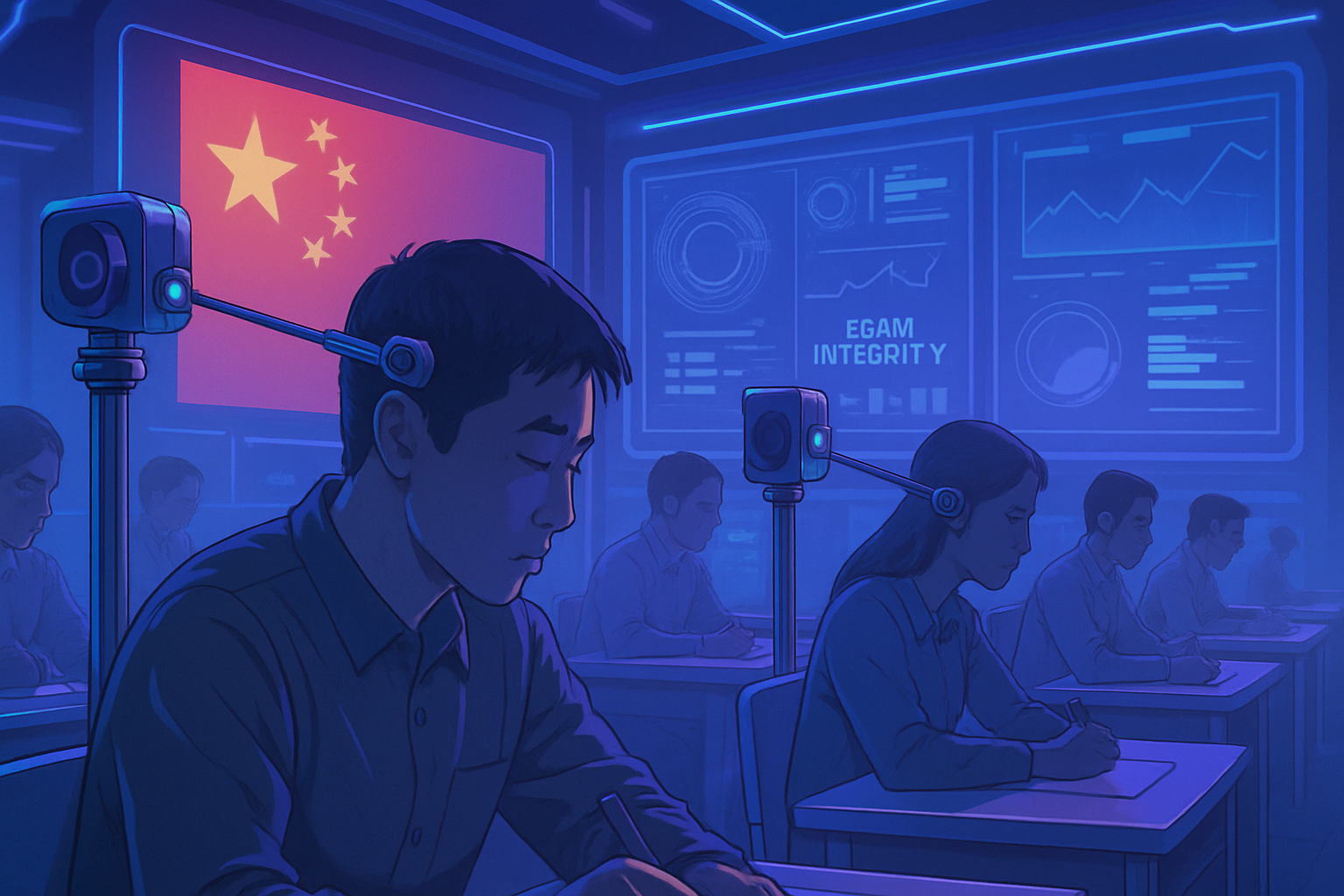The fight against cheating intensifies as China adopts bold measures to preserve the integrity of the gaokao. The challenge posed by artificial intelligence raises ethical and fairness questions, crucial for the academic future of millions of students. Chinese authorities are deploying advanced technologies to ensure an impartial examination, thereby redefining the contours of educational assessment. The determination displayed by the government illustrates an unwavering commitment to academic excellence and international rivalry.
The fight against cheating during the gaokao
The gaokao, China’s equivalent of the baccalaureate, represents an essential rite of passage for millions of high school students in China. This exam, which took place from June 7 to 10, is of vital importance for the academic future of students. The influx of artificial intelligence in smartphones and other devices raises concerns about the increased likelihood of cheating.
An appropriate response to the rise of artificial intelligence
In response to the rise of tools such as chatGPT, Gemini, and Mistral AI, Chinese authorities have adopted strict measures to maintain the integrity of results. During the exam, smartphones were *prohibited* and restrictions were imposed on the use of artificial intelligence applications. This control aims to ensure a fair assessment of candidates’ knowledge.
Measures put in place to ensure fairness
One notable action was the ban on uploading photos to certain artificial intelligence applications, such as Qwen, Doubao, and Deepseek. These applications have been programmed to prevent any use of functions that could facilitate cheating. Every attempt to solicit answers was met with a message informing that such actions were contrary to the terms of use.
Surveillance technologies at work
To strengthen the fight against cheating, several Chinese provinces have implemented surveillance technology. Smart cameras and microphones detect any suspicious communication between candidates, regardless of their degree of interaction. This setup aims to identify cheating behaviors, such as whispering and excessive visual exchanges.
The preventive measures have not only restricted candidates’ access to technological tools. They have also increased the *pressure* on students, making the exam even more stressful. Education officials hope to discourage those who might be tempted by illicit solutions.
Students’ reactions and societal impacts
Some frustration has been expressed by candidates who saw their requests for assistance unrelated to cheating refused by chatbots. Even innocent questions faced the barrier of artificial intelligence security. This situation is indicative of the tensions that exist between technological innovation and well-established educational traditions.
The importance of the gaokao for professional training and the job market adds further weight to these measures. Thus, Chinese society, while integrating artificial intelligence into various areas, finds itself in a dilemma between rapid innovation and adherence to academic standards.
The implementation of these technologies also raises questions about their long-term effectiveness. Can the devices and algorithms used to combat cheating truly *manage* the new methods that might emerge? This dynamic creates a lasting tension between traditional education and the challenges posed by modern technology.
An uncertain future for the gaokao and education
Chinese educational authorities continue to explore options to improve the education system while preserving the *serenity* of exams. The reliability of the technologies deployed to combat cheating is subject to ongoing debate. The future of the gaokao may depend on a delicate balance between technological innovation and fundamental educational values.
What strategy to adopt in the face of the growing *temptation* of artificial intelligence in education? Everyone hopes that the efforts made will lead to an authentic assessment of students’ skills, essential for their professional future in China.
Frequent questions regarding China’s measures against AI-assisted cheating during exams
What is the gaokao in China and why is it so important?
The gaokao is the national university entrance examination in China, comparable to the French baccalaureate. It is crucial for students as it determines their access to higher education and has a significant impact on their professional future.
What measures have been taken to prevent cheating during the gaokao?
To counter cheating, particularly via artificial intelligence applications, Chinese authorities have disabled the photo upload function on certain AI applications during the examination period.
Are smartphones allowed during the gaokao?
No, the use of smartphones is prohibited during the exam to prevent any form of cheating. Students must leave their devices outside or turn them off.
How does technology help to monitor exams?
Investments in advanced technologies such as smart cameras and microphones allow for the automatic detection of suspicious behaviors, such as whispering or exchanged glances between candidates.
What AI applications are affected by restrictions during the gaokao?
Popular AI applications like Qwen, Doubao, and YuanBao have been affected, preventing users from seeking assistance or submitting photos of the exam during the test period.
How many students take the gaokao each year?
In 2025, approximately 13.4 million students are expected to take the gaokao, making it one of the largest exams in the world in terms of participation.
Are the measures against cheating effective according to Chinese authorities?
The authorities believe that these measures ensure fairness in the exams, although it is possible that some candidates still find ways to circumvent the rules.
Why is AI-related cheating a major concern for the gaokao?
With the development of AI, it becomes easier for students to bypass the rules by obtaining real-time answers, which calls into question the integrity and fairness of the exam.






